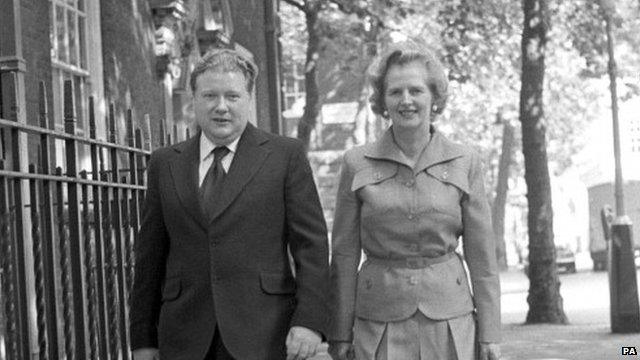Tory grandee Lord McAlpine dies at home in Italy
- Published
Alex Forsyth looks back at the life of Lord McAlpine
Lord McAlpine, the former UK Conservative Party deputy chairman has died, his family has announced.
The 71-year-old, who was an aide to Prime Minister Margaret Thatcher, died last night in Italy, his family said.
Prime Minister David Cameron tweeted, external his thoughts were with his family, adding he was a "dedicated supporter of Margaret Thatcher and the Tory party".
As well as a politician, the peer was an art collector, property developer, author and fundraiser.
He was also part of the McAlpine construction dynasty.
Founded by his grandfather, Sir Robert, the firm is one of the biggest builders in the UK, responsible for the London 2012 Olympic stadium among many other projects.

Lord McAlpine was among Lady Thatcher's closest friends and advisers
He was made a director of the family firm at 21, five years after dropping out of top public school Stowe with three O-levels.
Lord McAlpine then went on to make a fortune of his own as a property developer in Australia, before turning to politics in 1975, when he met Lady Thatcher.
He became one of her closest advisers and Conservative Party treasurer throughout her period in office, from 1979 to 1990.
She made him a life peer, Baron McAlpine of West Green in Hampshire, in 1984.
BBC News's political correspondent, Rob Watson, said: "Lord McAlpine was one of those Conservatives who believed in Margaret Thatcher right from the start - long before anyone inside or outside the party talked of Thatcherism.
"As a close political advisor and prolific Conservative party fundraiser, he was key to her success as a politician.
"A Eurosceptic, he briefly left the Conservative party in the 1990s but later returned."
In recent years, Lord McAlpine was wrongly implicated in a child abuse scandal, when the allegations were the subject of a BBC Newsnight investigation.
The programme aired allegations that a Thatcher-era politician was linked to boys that were sexually abused while in the care of a children's home in Wales in the 1970s and 1980s, though it did not name Lord McAlpine.
But several Twitter users were ordered to pay him damages after the High Court found they had tweeted libellous messages about the peer.
The BBC apologised unreservedly and settled his defamation claim for £185,000. The corporation's then director-general, George Entwistle, resigned in the wake of the allegations, after less than two months in the role.
'Towering figure'
Current Conservative chairman Grant Shapps said: "Lord McAlpine made a huge contribution to public life. He was a man of integrity who had a successful career in both politics and business.
"He was a towering figure during the Thatcher era who did much for the Conservative party and our country.
"My thoughts are with his friends and family."
Lord Tebbit: "He was a confidante [to Mrs Thatcher] which is very important to a prime minister"
Conservative MP for Maldon, John Whittingdale, who was Lady Thatcher's political secretary, said Lord McAlpine was a key contributor to her three election victories.
"Margaret Thatcher relied on him heavily, the Conservative Party in some senses was almost saved by the fact that he was able to go around and raise support for the party amongst his friends, so I think the party and indeed she owe him an immense debt," he said.
Tory former chairman and Cabinet minister Lord Parkinson, who worked closely with Lord McAlpine during the Thatcher era, said he was an "outstanding" treasurer.
"He was a most unusual, intriguing, interesting character with a fantastic range of interests," he added.
Former Conservative Party chairman, Lord Tebbit, told BBC News: "He was just a joy to be with because he always had something interesting to say. A man of enormously rich experiences of business, a very cultured man, he was very much interested in the arts, things of that kind, and also much travelled."
He added: "He was a confidant which is very important to a prime minister to have somebody of irreproachable integrity and great discretion that they can talk about anything and know that it would not go any further.
"Alastair would not talk even to me about things that were said between him and the prime minister."
- Published18 January 2014
- Published18 January 2014